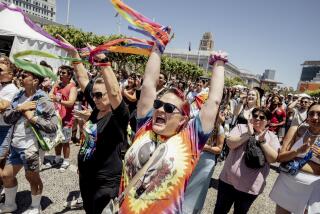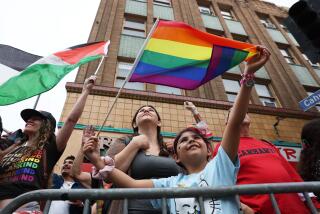Thousands Come Out for Gay Parade in Rome
- Share via
ROME — In a triumphant coming-out party that the Vatican tried to stop, tens of thousands of gay men and lesbians marched through this ancient capital Saturday to demand an end to bias against homosexuals in predominantly Roman Catholic Italy.
Leather-clad motorcyclists and a Communist Cabinet minister led the carnival-like procession, followed by bare-breasted transsexuals, drag queens in gaudy wigs, a provincial priest in clerical collar, two men frolicking in soap bubbles in a tub on wheels, and row after row of jubilant marchers in ordinary summer wear.
It was Italy’s first gay mega-gathering--an unusual spectacle for a city that has seen almost everything in its 2,752-year history--and the main event of World Pride Roma 2000, a weeklong festival that drew gay activists from about 40 countries.
Police estimated that there were 70,000 marchers, most of them Italians. They strolled peacefully from the Cestio pyramid down broad, leafy avenues around the edge of the city center and past the Colosseum before filling half the Circus Maximus for an evening rally.
Gay pride celebrations have drawn larger crowds to U.S. and northern European cities, but this was one of the biggest in a mostly Catholic country. And it was the most highly politicized gay event anywhere in years, staged despite opposition from the Vatican, Italian rightist parties, conservative Catholics and a small neo-fascist group.
In a victory for organizers two days before the march, city officials relented and allowed participants to pass by the Colosseum, a symbol of early Christian suffering.
“The constitution has won!” Katia Bellilo, the Communist minister for equal opportunity in Italy’s center-left government, declared Saturday. She marched near the front of the parade despite Prime Minister Giuliano Amato’s criticism that the event was “inopportune.”
“Today Italy is a little freer,” she added.
The gay festival got extensive coverage in Italy’s newspapers all week, provoking the country’s first serious debate about homosexuality. Some commentators likened the debate to the battles that led to Italy’s legalization of divorce in 1974 and of abortion in 1981, both over conservative Catholic opposition.
At stake this time is a government-sponsored bill, languishing in Parliament, that would outlaw hate crimes and a range of discriminatory practices against gay men and lesbians.
Several similar bills are on the table. Some would take the additional steps of legalizing same-sex marriages, allowing gay couples to adopt children and allowing homosexuals to be blood and organ donors.
Senate Vice President Ersilia Salvato told Saturday’s rally that the bills will now get prompt consideration and that at least one of them should become law.
Gianni Gredendino and Eugenio Castaldo, fashion designers who came to Rome from Naples to march, said they aren’t so optimistic about equal rights for gays as long as the church keeps teaching that homosexuality is a disorder and homosexual acts are sinful.
“But today Italians have demonstrated a different mentality,” Castaldo said, embracing his partner at the edge of the rally. “We have become more part of Europe.”
Leftist political and labor leaders who are not gay also joined the march. So did many heterosexual couples, some saying they came specifically to protest a failed Vatican effort to have the festival postponed or moved outside Rome.
Amid scores of anticlerical banners marched a lone village priest, Father Vitaliano della Sala, one of the few clerics in Italy openly advocating tolerance of gay Catholics. As he addressed the rally, the crowd shouted “Papa! Papa!” and proclaimed him its honorary pope.
He said he had heard that his superiors intended to discipline him for taking part.
After bluster and threats that prompted city officials to surround every gay event last week with scores of police, right-wing forces failed to mobilize big counter-protests Saturday.
About 100 people marched from St. Mary Major to St. John Lateran, two Catholic basilicas far from the parade route. They denounced the procession as a blasphemy against Catholic pilgrims visiting Rome for the church’s Holy Year celebrations.
A neo-fascist group, Forza Nuova, canceled its anti-gay demonstration, saying its members were mourning their leader’s 13-year-old daughter, who died Thursday of cystic fibrosis.
More to Read
Sign up for Essential California
The most important California stories and recommendations in your inbox every morning.
You may occasionally receive promotional content from the Los Angeles Times.










